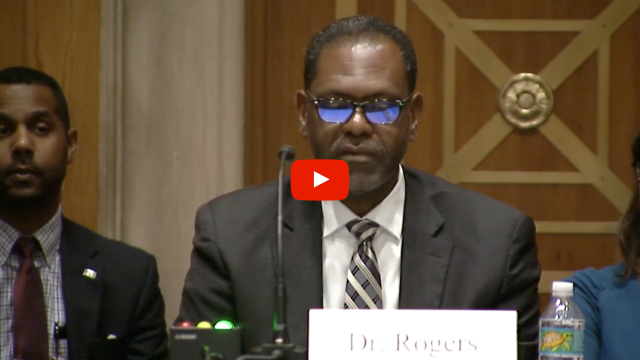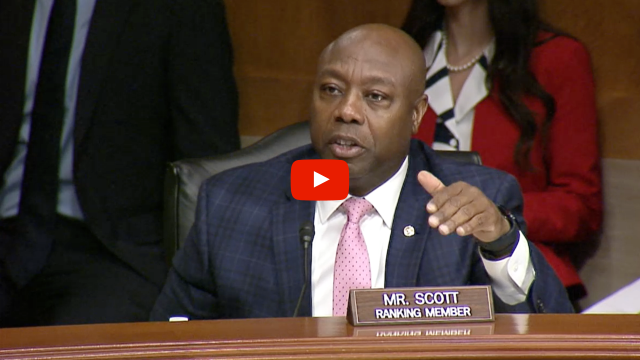Ranking Member Scott, Aging Committee Members Hold Hearing on Mental Health
WASHINGTON – Today, U.S. Senate Special Committee on Aging Ranking Member Tim Scott (R-S.C.), along with Chairman Bob Casey (D-Pa.), held a hearing titled “Mental Health Care for Older Adults: Raising Awareness, Addressing Stigma, and Providing Support.”
Speaking on the witness panel was Dr. Ken Rogers, state director of the South Carolina Department of Mental Health (SCDMH).
On the challenges of providing care to the aging population ... “One of the biggest challenges has been an increase in substance use during the pandemic. Since federal funding for substance use and mental health care are often split at the federal level, developing programs that address these co-occurring issues is often difficult and challenging. Secondly, many organizations do not provide both mental health and medical services in the same location. As a result, many older Americans have to visit multiple locations to obtain services. Each additional visit increases the likelihood that they will not obtain services or will drop out of services.”
On how SCDMH is making a difference … “There are several areas where South Carolina has done an exemplary job. We have developed excellent partnerships with law enforcement to make sure that officers are provided the skills needed to identify and manage services in a mental health crisis. … South Carolina has been very committed to increasing services for our veteran population. The state has worked closely with the Department of Veterans Affairs to increase the number of veterans’ nursing homes in South Carolina. This blending of state funding and federal funding has allowed us to expand and make a difference.”
Sen. Scott questioned Dr. Rogers on the benefits of Medicare and Medicaid integration, as well as the role law enforcement plays in mental health crises.
On Medicare and Medicaid integration …
Sen. Scott: “I'd like to continue on the discussion of the dual eligibles. Dr. Rogers, can you explain the benefits of dual eligible integration and how this will help states improve care once it is implemented?”
Dr. Rogers: “Absolutely. If you look at South Carolina, for example, and you've got someone that has a mental health crisis, and they end up in a hospital. That is often going to be paid for through Medicare. But let's say that person needs to go into the community and they need wraparound services. … Many of those are going to be covered by Medicare; many of those are going to be covered by Medicaid in South Carolina. And so I think that figuring out how to blend federal dollars and state dollars has been one of the ways that South Carolina has been able to manage our way through that, because many of the services that now aren't blended, the state has actually stepped in to cover many of those services.”
On the role of law enforcement in mental health crises …
Sen. Scott: “I think through my opening comments about the important role that law enforcement plays in so many crises around the country, and specifically at home, the importance of finding a path to having co-responders—mental health experts—also responding to the challenges that law enforcement officers are responding to … It’s one of the reasons why I've worked with Senator Cornyn and many others on the Law Enforcement De-escalation Training Act to find a way to help those two worlds come together in order to serve the communities who desperately need perhaps more assistance. Dr. Rogers, could you share the outcomes that have resulted from the partnership between the South Carolina Department of Mental Health and local law enforcement?”
Dr. Rogers: “Absolutely. I think this is an area where we really have excelled as a state. Currently, we're embedded with 17 of our local law enforcement agencies in South Carolina. The things that we have seen is we have our crisis intervention teams where we have officers that are actually going out with a trained clinician, usually a master's level clinician that's actually out with them in the field. If it's related to a mental health crisis, they're able to dually engage. We also have individuals who are in call centers, and so we're able to really triage those calls on the front end.
“For those areas that don't have an embedded clinician, we have mobile crisis that's available in all 46 counties in South Carolina. Those mobile crisis teams can be called out by a family, by law enforcement, really, by anyone. That allows us to respond, I think, to anything that's coming up in a fairly short period of time. …
“And then thirdly, something that we have done is we have what's called first teams. We recognize that law enforcement often are encountering individuals in very difficult times. Often there's not a place to talk about it. So as a department, one of the things that we have done is to develop mental health services specifically for first responders. … That has been a really incredible program that has benefited us a great deal. Frequently, where law enforcement's engaging with folks that are at their worst, they're in crisis at the time. And so trying to figure out whatever we can do to be able to support law enforcement as well as the individuals who are in crisis has been something critical to us to do in terms of our law enforcement partnerships.”
Sen. Scott: “Thank you, Dr. Rogers. One of the things I like to say before I know my time has run out, chairman, is the importance of that scene that you've just described—the ability to clear a scene, to let the mental health experts address the challenge. So often the folks who are calling the law enforcement officers to the scene are the family members who love the individual who needs to figure out how to de-escalate the situation. I think that's one of the reasons why it's so important that we don't just sugarcoat the issue, but dig a little deeper into how we create an apparatus that actually works for the family who's trying to figure out how to de-escalate the situation, not to watch it explode in their very homes. So thank you very much for that answer.”
###

